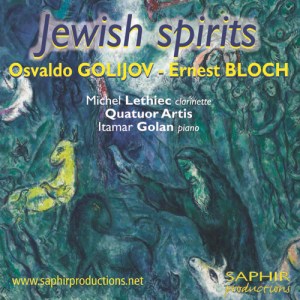|

Support
us financially by purchasing this disc from: |
|
|
|
|
|
|
|
Jewish Spirits
Osvaldo GOLIJOV (b.1960)
The Dreams and Prayers of Isaac the Blind for klezmer clarinet
and string quartet (1994) [29:59]
Ernest BLOCH (1880-1959)
Jewish Life [9:46]
Abodah [7:24]
 Michel Lethiec (clarinet), Itamar Golan (piano), Artis Quartet (Peter
Schuhmayer (violin I), Johannes Meissl (violin II), Herbert Kefer
(viola), Othmar Müller (cello).
Michel Lethiec (clarinet), Itamar Golan (piano), Artis Quartet (Peter
Schuhmayer (violin I), Johannes Meissl (violin II), Herbert Kefer
(viola), Othmar Müller (cello).
rec. live, Prades Pablo Casals Festival, Abbey of St. Michael of
Cuxa, Spain, 5 August 2008 (Golijov); St Marcel Evangelical Church,
Paris, France, 30 November 2011 (Bloch)
 SAPHIR PRODUCTIONS LVC 1175 [47:32]
SAPHIR PRODUCTIONS LVC 1175 [47:32]
|
This disc is an opportunity to get to know the magic of klezmer
in a classical music framework. It’s a rare chance since
most klezmer is used on high days and holidays among Jews. It
is also to be found reflecting suffering, nostalgia and sadness;
in that sense performing a similar function to the blues or
fado. There has been a resurgence of this music since the 1980s
by which time it had almost disappeared. For anyone not already
acquainted it will come as a surprise because it creates a different
sound-world to what is usual in classical music. The great klezmer
clarinettist Giora Feidman described klezmer as “an interpretation
of art and life based not solely on Jewish folklore, but rather
on a cosmopolitan divergence of musical genres”. By this
he meant that all kinds of influences fed into the music much
of which emanated from Bessarabia (part of Romania), where it
absorbed Romanian folk music themes just as it did Bulgarian,
Turkish and Hungarian as well as themes from other Central and
Eastern European countries. In turn it exerted its influence
on the music of those countries. The result is a rich musical
soup that whilst immediately recognisable as Jewish also has
discernible elements from these other musical cultures.
The Argentinean composer Osvaldo Golijov’s family were
Jews from Eastern Europe. Throughout his childhood he came under
the influence of this rich musical tradition so it is no surprise
that he should want to incorporate klezmer in some of his compositions.
Taking for inspiration the story of Cabalist rabbi Isaac the
Blind (1160-1235), Golijov has written a work that uses klezmer
melodies throughout. Divided into five movements it opens with
a short prelude that is introduced by the string quartet and
which creates a suitably sombre and reflective atmosphere. The
clarinet joins in to take the central role and this prelude
merges into the second movement marked agitato which
it certainly is with the clarinet reproducing a moaning sound.
The third movement, based upon an old klezmer song ‘The
Old Klezmer Band’ is for dancing. After its introduction
in a slow dirge-like mode it breaks out into a faster rhythmic
meter. These two contrasting speeds then alternate.
Though I’ve tried to discover the answer I am still unsure
whether the ‘klezmer clarinet’ is in any way different
to a conventional one or whether it is more down to the method
of playing. In any event it can in klezmer be hugely successful
in creating both intensely sad sounds as well as riotously festive
ones. In this composition the sad sounds are sometimes joined
by the odd human moan emphasising the black mood. The fourth
movement marked calmo is quite hauntingly beautiful and
it merges into the postlude that closes the composition.
Written in 1924, Ernest Bloch’s three movement Jewish
Life for cello and piano opens with Prayer. This
sets a suitably serious note with the clarinet taking the place
of the cello. The second and third movements entitled Supplication
and Jewish Song, are very evocative with sad melodies
reflecting long centuries of hardship and persecution. In 1929
Bloch composed the final work on the disc, Abodah for
violin and piano. This is an arrangement of a Yom Kippur melody
and was given its première by the young Yehudi Menuhin.
Working equally well on clarinet it is yet another sad tune.
Both these compositions embody the Jewish spirit which has survived
despite the odds.
The serious and reflective nature of these compositions is perfectly
captured by the clarinettist Michel Lethiec who is extremely
well supported by The Artis Quartet and pianist Itamar Golan.
This is a very unusual but fascinating disc that will be of
interest to klezmer enthusiasts and would serve as an interesting
and instructive introduction for those who have not come across
it. Once discovered the music is infectious. There are many
discs available that contain a good cross-section of not just
serious but highly exuberant and exciting klezmer.
Steve Arloff
|
Support
us financially by purchasing this disc from:
|
|
|
|
|
|
|
|
|
|















